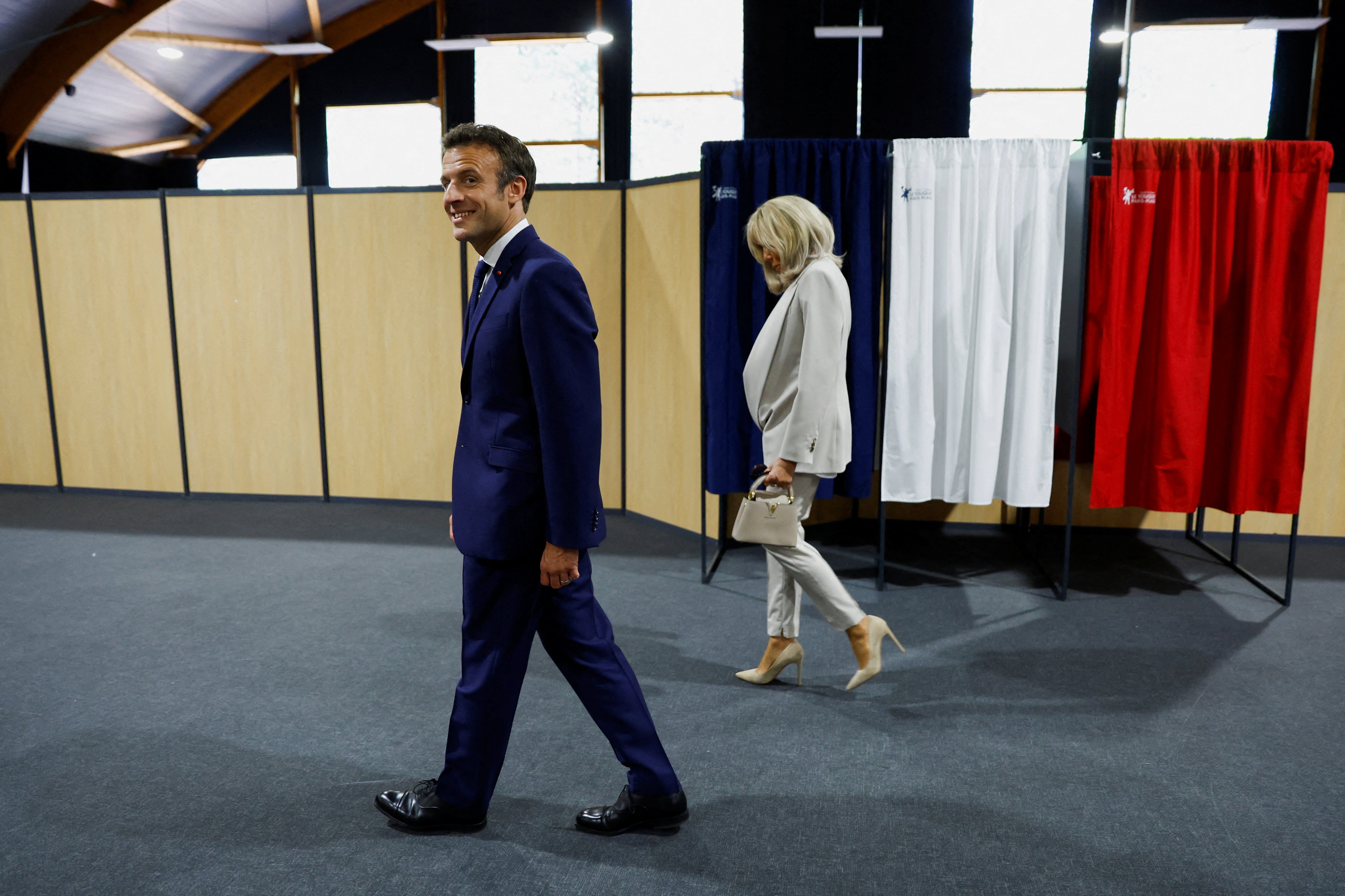
Isabelle Mayneris did not vote for President Emmanuel Macron on Sunday just because she was afraid of far-right challenger Marine Le Pen. Or because he was the least unpalatable of several unpalatable choices.
The 56-year-old estate agent and consultant said she voted for Mr Macron because she likes him. She said he has been doing a relatively good job for France. She also voted for him in the first round of the elections two weeks ago.
“I like what he did for young people,” she said, after casting her ballot in the ninth arrondissement in central Paris. “No one talks about unemployment any more because he has created so many jobs. Everyone says he’s arrogant. I say he’s intelligent,” she told The Independent.
The French went to the polls on Sunday for a closely watched election that holds enormous implications for France, Europe and the world.
In Rennes, voters waiting in line held umbrellas to shield themselves from the rain. In central France crisp, cool partly cloudy weather greeted early voters. Many French voters came to the polls with their children. Others came with their pets, leashing dogs outside of polling centres at schools and municipal buildings.
Ms Pen, 53, a far-right longtime ally of Russian President Vladimir Putin, has vowed to strip immigrants of rights and privilege, further stigmatise French Muslims, drastically reduce Paris’ contributions and remove France from the Nato chain of command.
Mr Macron, 44, an avowed pro-EU centrist, upended the two-party duopoly of the centre-left and centre-right in 2017. Over the last five years, he pursued a murky agenda aimed at making France more economically competitive and internationally prominent, but was waylaid by several crises including the coronavirus pandemic.
The two squared off five years ago in a second-round election that Mr Macron easily won with 66 per cent of the vote. And in consecutive polls this time, Mr Macron appears to have built up a comfortable lead over Ms Le Pen that widened slightly after a three-hour televised debate on Wednesday.
But Ms Le Pen’s performance in the debate was not nearly as disastrous as her appearance five years ago, in which she lost her cool and appeared confused. She has consistently been polling at about 45 per cent of the vote, and given the margin of error, could still pull off an upset.
An unconfirmed leak, published by Belgian media, suggested that Ms Le Pen was leading the vote against Mr Macron in several French overseas districts that the president had easily won in 2017.
"There are going to be surprises tonight,” one Le Pen supporter in the northwest town of Hénin-Beaumont, where the challenger voted, was quoted as saying in the daily Le Monde.
Among the worries for the president and his supporters are high abstention rates among potential voters who are too apathetic, too distracted or too alienated from the political candidates . Some 26 per cent of 48.8 million eligible French voters did note show up at the polls on 10 April, the highest number of first-round abstentions in decades.
The French media on Sunday specualted it could be the lowest ever turnout in a presidential election.
By noon, 26.4 per cent of French voters had cast ballots compared to 28.2 per cent at the same time during elections five years ago, according to Ministry of Interior figures.
Most analysts agree a low turnout would hurt Mr Macron more than Ms Le Pen, who has attained an almost cult-like status within the French and European far-right and has an enthusiastic base of supporters.
Mr Macron has been hammered by voters and the media for being out-of-touch and elitist. But his favorability ratings at the end of his first time exceed those of his predecessors, including Francois Hollande, who did not seek reelection, Nicolas Sarkozy and Jacques Chirac.
“We are an angry people,” said Ms Mayneris, explaining the disdain French have for their political leaders. “We cut off our kings’ heads.”
Mr Macron’s supporters also worry about what supporters of leftist candidate Jean-Luc Melenchon will do. He obtained a surprise 22 per cent of first-round votes on a platform of social justice and anti-racism that drew young French voters as well as immigrants and Muslims.

Mr Melenchon refused to endorse Mr Macron in the second round but urged his supporters not to vote for the far-right. Whether these swing voters will stay home, vote for Mr Macron or even vote for Ms Le Pen as a protest may very well determine the election results.
Ms Mayneris described herself as a leftist, and said she supported Macron because his government had helped the most vulnerable during the Coronavirus pandemic with financial support. Covid testing was free in France during the pandemic, and schools remained largely open—feats she said Mr Macron was not given enough credit.
He also implemented economic reforms that allowed young graduates to more easily obtain entry-level jobs. But she said Mr Macron’s embrace of the gig economy had gone too far, and that she hoped he would up protections for such workers during a second term.
“He went too far in allowing the Uberization of the economy,” she said.





